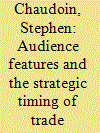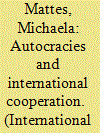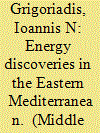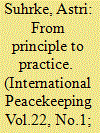|
|
|
Sort Order |
|
|
|
Items / Page
|
|
|
|
|
|
|
| Srl | Item |
| 1 |
ID:
135360


|
|
|
|
|
| Summary/Abstract |
The Global Exploration Roadmap (GER) is driven by several goals and objectives that include space science, the search for life as well as preparatory science activities to enable human space exploration. The Committee on Space Research (COSPAR), through its Commissions and Panels provides an international forum that supports and promotes space exploration worldwide. COSPAR's Panel on Exploration (PEX) investigates a stepwise approach of preparatory research on Earth and in Low Earth Orbit (LEO) to facilitate a future global space exploration program. We summarize recent activities and workshops of PEX in support of the GER.
|
|
|
|
|
|
|
|
|
|
|
|
|
|
|
|
| 2 |
ID:
134961


|
|
|
|
|
| Summary/Abstract |
This special issue of the Asia Europe Journal focuses on a triangulated conversation between scholars working in/on Asia, Europe and Australia. The essays showcase the work of early career researchers involved in the EU-Oceania Social Science Inter-regional Consortium (EUOSSIC) Erasmus Mundus exchange programme that links leading universities in Europe1 with those in Australia2 and New Zealand3 to promote the study of European Union (EU) external relationships. Erasmus Mundus was launched in 2004 and is funded by the Education and Culture Directorate General of the European Commission with the objectives of enhancing the quality of European higher education and the promotion of dialogue and understanding between people and cultures through cooperation with third countries. The aim of the EUOSSIC Erasmus Mundus exchange programme (2011–2013) is to build on existing connections to create a formal programme of inter-regional exchanges between the EU and Oceania for doctoral and post-doctoral scholars as well as academic staff with a Social Science background. In total, 61 doctoral students, 11 post-doctoral fellows and 27 academic staff were involved in the EUOSSIC Erasmus Mundus programme.
|
|
|
|
|
|
|
|
|
|
|
|
|
|
|
|
| 3 |
ID:
134980


|
|
|
|
|
| Summary/Abstract |
If international institutions are such potent alarm mechanisms that mobilize procompliance domestic audiences, as many existing theories argue, why do countries wait so long before sounding the alarm? World Trade Organization (WTO) members often wait months or even years before objecting to their trading partners’ WTO-illegal barriers. To turn a phrase, trade cooperation delayed is trade cooperation denied, so why wait? To explain this variation, I develop a theory of institutional alarm mechanisms in which (1) the preferences and strength of the audience hearing the alarm vary and (2) the decision to sound the alarm is strategic. Sounding the alarm is most valuable when strong audiences in the defendant country support compliance. I test this prediction using competing risks models analyzing the timing of WTO disputes against US tariff barriers. Consistent with the theory, disputes are more likely during election years when macroeconomic indicators suggest broader support for free trade.
|
|
|
|
|
|
|
|
|
|
|
|
|
|
|
|
| 4 |
ID:
134519


|
|
|
|
|
| Summary/Abstract |
Scholarly work on the impact of domestic politics on international cooperation has grown significantly over time. Unfortunately, there is a democratic bias to much of this literature as scholars typically focus on the relative advantage of democracies at cooperation. Our paper seeks to shed more light on the cooperation potential of autocracies by distinguishing different types of autocratic regimes. We argue that autocracies that more closely resemble democracies in the institutional characteristics that have been found to be important for cooperation (that is, greater leader accountability, limited policy flexibility, and greater transparency) should be more successful at cooperation and thus more likely to cooperate with one another and with democracies. Specifically, we expect single-party and military regimes to be advantaged at international cooperation compared to personalist systems. We test our theoretical expectations using the 10 Million International Dyadic Events data (1990–2004) and find support for our theoretical argument.
|
|
|
|
|
|
|
|
|
|
|
|
|
|
|
|
| 5 |
ID:
136020


|
|
|
|
|
| Summary/Abstract |
Europe’s attempts to expand its sources of natural gas have been hampered by a series of geopolitical challenges, Georgiy Voloshin and Andrew Neff examine whether the planned southern gas corridor will reduce Europe’s reliance on Russia supplies.
|
|
|
|
|
|
|
|
|
|
|
|
|
|
|
|
| 6 |
ID:
135122


|
|
|
|
|
| Summary/Abstract |
Edward Snowden’s June 2013 leak has shone unprecedented light on the dark underside of Internet connectivity. So far, however, Canada has remained a victim largely hidden in the shadows.
Much of the debate over the National Security Agency (NSA) revelations has focused on U.S. domestic surveillance of individuals never under suspicion. But whatever modest legal protections Americans may enjoy, all those outside the United States are classified as foreigners and have no such protection. And while we know most about the NSA’s domestic surveillance operations, the Snowden documents make very clear that with the aid of its allies—Great Britain, Canada, Australia, and New Zealand—the NSA has developed a globe-spanning surveillance infrastructure of remarkable scale and scope. Not surprisingly, the NSA has targeted countries regarded as “unfriendly” to American interests, such as China, Russia, and Iran, but the Agency has also been intercepting and analyzing the internal communications of countries generally regarded as “friendly” allies, such as Brazil, Denmark, Germany, France, India, Italy, Netherlands, Norway, Spain, and many more. The aptly named Boundless Informant program reported that in one month alone, the NSA’s Global Access Unit collected data on over 97 billion emails and 124 billion phone calls from nearly every country.
|
|
|
|
|
|
|
|
|
|
|
|
|
|
|
|
| 7 |
ID:
136328


|
|
|
|
|
| Summary/Abstract |
The Asia-Pacific region has evolved in to a main battlefield of international strategic rivalry. Tensions are escalating in China’s surrounding areas. China should strike a dynamics balance between defending its legitimate rights and ensuring regional stability by seizing the strategic initiative in managing crises and conflicts on the basis of stabilizing foreign relations and pressing on with international cooperation.
|
|
|
|
|
|
|
|
|
|
|
|
|
|
|
|
| 8 |
ID:
136182


|
|
|
|
|
| Summary/Abstract |
WOOYEAL PAIK and RICHARD BAUM argue that a growing number of Chinese feel frustrated by and alienated from local government agencies. They argue that clientelist alliances constitute a growing threat to the stability of the Chinese Communist party.
|
|
|
|
|
|
|
|
|
|
|
|
|
|
|
|
| 9 |
ID:
134979


|
|
|
|
|
| Summary/Abstract |
Why do some decision makers prefer big multilateral agreements while others prefer cooperation in small clubs? Does enforcement encourage or deter institutional cooperation? We use experiments drawn from behavioral economics and cognitive psychology—along with a substantive survey focused on international trade—to illustrate how two behavioral traits (patience and strategic reasoning) of individuals who play key roles in negotiating and ratifying an international treaty shape their preferences for how treaties are designed and whether they are ratified. Patient subjects were more likely to prefer treaties with larger numbers of countries (and larger long-term benefits), as were subjects with the skill to anticipate how others will respond over multiple iterations of strategic games. The presence of an enforcement mechanism increased subjects' willingness to ratify treaties; however, strategic reasoning had double the effect of adding enforcement to a trade agreement: more strategic subjects were particularly likely to favor ratifying the agreement. We report these results for a sample of 509 university students and also show how similar patterns are revealed in a unique sample of ninety-two actual US policy elites. Under some conditions certain types of university student convenience samples can be useful for revealing elite-dominated policy preferences—different types of people in the same situation may prefer to approach decision-making tasks and reason through trade-offs in materially different ways
|
|
|
|
|
|
|
|
|
|
|
|
|
|
|
|
| 10 |
ID:
137064


|
|
|
|
|
| Summary/Abstract |
Donors often condition foreign aid to recipients on policy adjustments. How do domestic interest groups influence a donor’s ability to credibly commit to implementing threats and promises? In our model, domestic interest groups in the donor country can mobilize to support the donor’s implementation of punishments and rewards. The expectation of such mobilization influences the credibility of threats and promises at the prior contracting stage. The analysis produces three central findings. First, the donor chooses to rely on a single instrument when the domestic interest group exhibits a strong preference for that instrument, even if the cost of using that instrument is relatively high. Second, for credibility reasons the donor often promises generous rewards or threatens ruthless sanctions that seem out of proportion. Finally, the donor cannot simultaneously make credible threats and promises unless domestic interest groups mobilize to support both instruments. We examine the case of US foreign aid to Israel and Palestine to illustrate these theoretical propositions.
|
|
|
|
|
|
|
|
|
|
|
|
|
|
|
|
| 11 |
ID:
135766


|
|
|
|
|
| Summary/Abstract |
While malicious acts by insurgents, rebels and tribes have attracted considerable attention in recent years; peacekeeping fatalities are most often caused by accident and illness. Yet despite this, malicious acts remain the major focus of journalistic reporting and academic study. This article places malicious acts into a broader context and highlights the more pressing threats posed by accident and illness.
|
|
|
|
|
|
|
|
|
|
|
|
|
|
|
|
| 12 |
ID:
134588


|
|
|
|
|
| Summary/Abstract |
The discovery of oil and natural-gas reserves in the Middle East at the beginning of the twentieth century changed the fate of the region. From a backwater of international politics, the Middle East became central to international strategic rivalries. Almost a century later, energy discoveries in the Eastern Mediterranean are unlikely to bring about such tectonic shifts in the strategic fortunes of the Levant. Yet they have generated a fresh interest in their potential impact on existing regional disputes and power constellations.
|
|
|
|
|
|
|
|
|
|
|
|
|
|
|
|
| 13 |
ID:
134538


|
|
|
|
|
| Summary/Abstract |
In spite of geographic proximity and a number of shared interests, the European Union and Libya have a history of strained relations. The war of 2011 provided an opportunity for a fresh start, but so far neither side has been able to reap benefits from an entirely new political situation. Instead, Libya’s difficult internal situation has not only slowed down the process of rapprochement, but also increased EU concern. At a time when cooperation becomes a necessity rather than a choice, Libya is now down-spiralling into implosion at the levels of security, bureaucracy and economy, to the point where it cannot absorb the offers being made.
|
|
|
|
|
|
|
|
|
|
|
|
|
|
|
|
| 14 |
ID:
134964


|
|
|
|
|
| Summary/Abstract |
The Asia-Europe Meeting (ASEM) held its 9th Summit in November 2012, marking 16 years of existence. Because of its biennial character, around the time of Summits, ASEM usually gains increased attention. And it is around each Summit that questions about ASEM’s relevance and contribution to global politics re-surface. While political and economic cooperation have attracted much anticipation and analyses, this essay draws attention to the under-researched socio-cultural pillar. It re-assesses the role of socio-cultural cooperation in the relations between Asia-Europe and its relevance to the Asia-Europe Meeting process overall. The study analyses the stream of activities and the design of programmes coordinated by the Asia-Europe Foundation (ASEF), the only permanent institution of the ASEM process, responsible for the “third-pillar” implementations. ASEF in this analysis serves as a reflection of ASEM, and by looking into working mechanisms and evaluating ASEF’s effectiveness, the author evaluates ASEM. The purpose of this study is to offer the first comprehensive analysis of Asia-Europe Foundation, which recently celebrated its 15th anniversary, by examining its relationship with the ASEM process. The study evaluates ASEF’s contribution to Asia-Europe inter-regional cooperation and outlines the limitations that the Foundation faces. A multi-method research approach is adopted including data from the ASEF archives and reports of its activities, and analysis based on the existing literature and official documents of ASEM and ASEF, as well as in-depth interviews conducted by the author.
|
|
|
|
|
|
|
|
|
|
|
|
|
|
|
|
| 15 |
ID:
137046


|
|
|
|
|
| Summary/Abstract |
Norm challenge is a continuous feature of international norms. However, the dynamics of such a challenge are still not properly understood. Therefore, this article examines in-depth the key processes involved in a major, but still underexplored challenge in the case of the nuclear non-proliferation regime: the recent accommodation of India in the regime, even though it developed nuclear weapons in violation of the regime's fundamental non-proliferation norm. More specifically, it will focus on how certain states came about to support such a norm challenge. In this regard, the European Union and its member states played a crucial role, as they included both very supportive and very reluctant states that all had the opportunity to block India's accommodation in the regime. In contrast to the traditional focus on persuasion and argumentation in the norm-based literature, this article argues that it was the peculiar interplay of persuasion and argumentation with material incentives, pressure, and bargaining that created the support for norm challenge in the early stages, in particular in the case of the states that remained highly sceptical of the challenge.
|
|
|
|
|
|
|
|
|
|
|
|
|
|
|
|
| 16 |
ID:
136530


|
|
|
|
|
| Summary/Abstract |
There is a history of engagement between scientists in the European Union and the Russian Federation (and, previously, the Soviet Union). This cooperation is based on the bilateral interests of governments and individual scientists alike for interaction and engagement. It also fits the EU’s broader policy goals, whereby “international cooperation in research and innovation [is seen] as an instrument of soft power and a mechanism for improving relations with key countries and regions.”1 Now, with the events in Ukraine and mutual EU and Russian sanctions, science can again—as it did during and immediately after the Cold War—play a role in sustaining dialogue and continuing fruitful and mutually beneficial connections that could help reestablish broader links. The significant scientific cooperation activities between EU member states and countries associated with its Framework Programme for Research and Technological Development, the EU’s key instrument of international science and technology (S&T) cooperation, and the Russian Federation provide a solid basis to jointly tackle common societal challenges. This paper describes an approach aimed at better understanding these challenges and determining how future scientific collaborations can most appropriately and effectively tackle them.
|
|
|
|
|
|
|
|
|
|
|
|
|
|
|
|
| 17 |
ID:
136162


|
|
|
|
|
| Summary/Abstract |
Does foreign aid prop up authoritarian regimes or is it conducive to democratic reforms? We use a two-level perspective that takes the domestic incentives of both the recipient and the donor into account to review the existent literature respecting this question. By bringing together research on democracy and autocracy with the literature on aid effectiveness and the political economy of aid provision, we provide a political economy perspective against which the mixed effects of foreign aid on political regimes can plausibly be explained. Against this background, research on aid effectiveness may give more attention to incentives in recipient countries and may take on a more comprehensive perspective on international relations. At the same time, the debate on authoritarianism may also gain insight into authoritarian strategies by investigating aid negotiations.
|
|
|
|
|
|
|
|
|
|
|
|
|
|
|
|
| 18 |
ID:
137142


|
|
|
|
|
| Summary/Abstract |
During its engagement in Afghanistan, the US military seriously tried to mitigate the risk of civilian casualties from airstrikes only when called for by changes in military doctrine emphasizing the need to gain the support of the population. Consistent efforts by external political and humanitarian actors to reduce casualties by demanding more transparency and clearer lines of accountability for ‘collateral damage’ had little immediate, observable effect. The case study underlines the contingent nature of progress towards protecting civilians in armed conflict even when a military institution formally accepts the principles of customary international humanitarian law, but concludes that, faute de mieux, strategies to enhance protection through greater accountability and attention to the kind of military ordinance used remain central.
Over time there have been significant advances in international humanitarian law to strengthen the protection of civilians during armed conflict, and, as Adam Roberts notes, ‘in practice something has been achieved’.1 The record of the US military forces in Afghanistan after 2001, however, underlines the element of contingency in this development. During more than a decade of combat engagement in Afghanistan, the US military operated in a context of customary international law that was formally observed, but measures to reduce the impact of military operations on civilians varied significantly in practice. Only in two short periods did the USA or joint ISAF (International Security Assistance Force) command adopt practices to seriously mitigate the risk of civilian casualties. What explains this variation over time, and what does it tell us about the influence of legal norms on the belligerent?
Civilian casualties produced by US airstrikes produced the vast majority of casualties attributed to allied operations in Afghanistan. Authoritative sources reported almost 2,000 were killed and many more injured in the period 2006–13 (see Table 1).2 The US military and ISAF considered the civilian deaths as incidental damage – the unfortunate, accidental effects of war. Yet as Neta Crawford has argued, these effects were systemic in nature.3 They were ‘normal accidents’ in the sense originally developed by Charles Perrow: the predictable outcome of a flawed system design.4
|
|
|
|
|
|
|
|
|
|
|
|
|
|
|
|
| 19 |
ID:
135356


|
|
|
|
|
| Summary/Abstract |
The Global Exploration Roadmap reflects the collaborative effort of twelve space agencies to define a long-term human space exploration strategy which provides substantial benefits for improving the quality of life on Earth and is implementable and sustainable. Such a strategy is a necessary precondition to the government investments required to enable the challenging and rewarding missions that extend human presence into the solar system. The article introduces the international strategy and elaborates on NASA's leadership role in shaping that strategy. The publication of the roadmap, a reflection of the space landscape and multilateral agency-level dialog over the last four years, allows NASA to demonstrate its commitment to leading a long-term space exploration endeavor that delivers benefits, maintains strategic human spaceflight capabilities and expands human presence in space, with human missions to the surface of Mars as a driving goal. The road mapping process has clearly demonstrated the complementary interests of the participants and the potential benefits that can be gained through cooperation among nations to achieve a common goal. The present US human spaceflight policy is examined and it is shown that the establishment of a sustainable global space exploration strategy is fully consistent with that policy.
|
|
|
|
|
|
|
|
|
|
|
|
|
|
|
|
| 20 |
ID:
134963


|
|
|
|
|
| Summary/Abstract |
Southeast Asia shares many similarities with Europe, among others, deep economic, historic and cultural ties, as well as the trauma of wars, which led to the desire to turn battlefields into marketplaces. However, in Southeast Asia, regional economic integration has preceded institutional integration, reversing the order of European integration. Despite drawing on different models of integration, programmes favouring the setting up of cross-border and transnational areas have burgeoned both within the European Union (EU) and the Association of Southeast Asian Nations (ASEAN). The Greater Mekong Subregion (GMS) development programme, supported by the Asian Development Bank (ADB) since the early 1990s, is currently one of the most dynamic transnational integration processes occurring in mainland Southeast Asia. Among the flagship initiatives of the programme are three economic corridors that have revived the ancient caravan trade routes and networks, which once traversed the Indochinese peninsula. This article sketches out the specificities of the GMS integration by examining the “corridor approach”. As institutional regionalism in Europe appears to have encountered problems, and Southeast Asia seems to have stretched its open and network-based integration model to a great extent, the main argument of this essay is that reflections on the success and the limits of the GMS’ specific type of integration can contribute to a new understanding of regionalism, particularly in Asia.
|
|
|
|
|
|
|
|
|
|
|
|
|
|
|
|
|
|
|
|
|